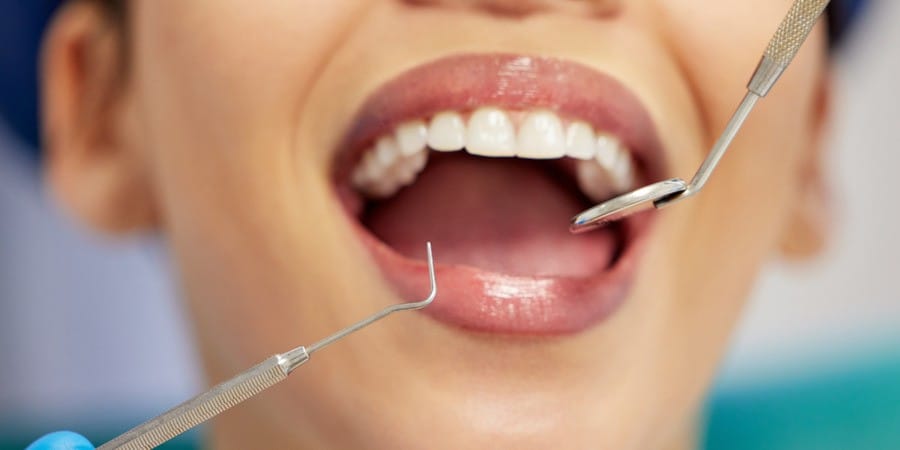What Is Gingivitis?
Gingivitis is a painless condition in which your gums become irritated by the bacteria in dental plaque and tartar (calculus). It is a mild gum infection that can be easily managed with professional dental care combined with a better oral care routine at home.
However, if left untreated, gingivitis will develop into periodontitis, which is far more severe and trickier to treat. It is a form of advanced gum disease that can destroy your gums, jawbone, and periodontal ligaments and cause tooth loss.

What Are the Symptoms of Gingivitis?
The symptoms of gingivitis can be quite subtle, so you may not realize you have this condition initially. As it worsens, you may notice the following symptoms start to develop:
- Swollen, red gums.
- Gums that bleed easily, especially when you brush or floss your teeth.
- Increased sensitivity to hot or cold foods and beverages.
- Persistent bad breath, even after brushing your teeth.
- Pain or discomfort when you chew food.
What Are the Risk Factors for Gingivitis?
Anyone can develop gingivitis, but your risk could be higher if you have any of the following issues.
- Fail to follow a good oral hygiene routine at home.
- Have crooked or tightly packed in teeth that are tricky to keep clean.
- Have a family history of gum disease.
- Are pregnant or experiencing other hormonal changes.
- Are currently receiving radiotherapy or chemotherapy.
- Take oral contraceptives.
- Smoke or use other tobacco products.
- Take certain medications like those to treat epilepsy or which can cause dry mouth.
How Is Gingivitis Diagnosed?
If you have regular dental exams at Clock Tower Dental, you can rest assured that we carefully monitor your gum health. During your checkup, we carry out a visual examination, checking for any signs that include:
- Bleeding gums.
- Gums that look red or swollen.
- Signs of gum recession where your gum tissue has begun to pull away from your teeth.
- Loose teeth or changes to your bite.
We also use a small periodontal probe to check the spaces between each tooth and gum. When your gums are healthy, strong, and infection-free, they fit snugly around your teeth.
The gaps between your teeth and gums would not exceed 3 mm. If you have any signs of gum infection, these pockets could increase. These measurements are compared with measurements from your previous visit so we can easily check for any signs of changes to your dental health.
If we suspect gum disease, we will take digital dental X-rays to see if the infection has affected your jawbone. The X-rays will show the bone levels around each tooth.
How Is Gingivitis Treated?
Mild gingivitis is straightforward to treat, but if we suspect the condition is more severe, we may refer you to our periodontist.
The treatments for gingivitis are outlined below.
Professional Dental Cleaning
The first step is to remove the plaque and tartar buildup, which causes infection and inflammation in your gums. You may only need a routine dental cleaning, or we may recommend scaling and root planing, a deeper dental cleaning that reaches further into your gums.
Improving Your Oral Care Routine
After cleaning your teeth and gums, we can discuss improving your oral care routine at home. Our hygienist will have identified areas in your mouth that could use extra care and can demonstrate the latest brushing and flossing techniques. These will ensure you can brush and floss quickly and efficiently, removing the maximum amount of plaque and food debris.
We know people often find it tricky to floss, and if so, please let us know. There are plenty of other ways to clean between your teeth, and we can discuss other tools to use instead.
Our dentist or hygienist may also recommend you use an antimicrobial mouth rinse after brushing. Using mouth rinse regularly can help destroy harmful bacteria.
It is important to persevere with a good oral care routine at home after your teeth have been cleaned professionally. Initially, your gums may bleed, but if you continue brushing at least twice daily and flossing every day, they will gradually become less fragile. As they get stronger and firmer, they will stop bleeding.
Restorative Dentistry or Orthodontics
If you have some dental work that doesn’t fit particularly well or is aging or has sharp or rough spots, we may recommend adjusting or replacing these restorations. Smoother surfaces are easier to brush and floss thoroughly.
If your teeth are particularly crooked, you may wish to consider orthodontics to help straighten them. Straighter teeth are easier to keep clean, helping to reduce your risk of gum disease.
Pregnancy Gingivitis Treatment
During pregnancy, hormonal changes increase the sensitivity of gums to plaque bacteria, potentially causing a condition called pregnancy gingivitis. The symptoms of pregnancy gingivitis are similar to ordinary gingivitis, so gums can bleed more easily and frequently and start to look red and swollen. Pregnancy gingivitis tends to develop in the second trimester and continues until the baby is born.
If you are pregnant, we recommend scheduling a dental checkup as soon as possible so we can check your oral health carefully. Maintaining good oral care during pregnancy is important, and many routine treatments, including dental exams and hygiene treatments, are perfectly safe.
Our dentist can check for signs of pregnancy gingivitis and, if so, recommend suitable and safe treatment, usually by cleaning your teeth professionally. We might recommend more frequent dental cleanings during your pregnancy to help maintain strong and healthy gums.
Has It Been a While Since Your Last Dental Checkup?
If it has been a while since your last dental checkup or you have noticed your gums bleed during brushing, contact Clock Tower Dental to schedule your dental exam. Regular dental exams are the easiest way to ensure your gums remain strong, healthy, and free from infection.

